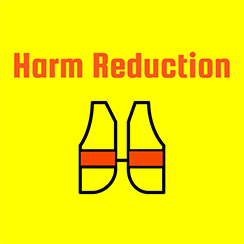 This self-paced, online training course is designed to provide learners with the knowledge, tools, and strategies required to apply everyday, intuitive, harm-reducing behaviour to substance use in the workplace, as well as in the greater community. The course explores and examines how our collective thinking about substance use has been impacted by widespread stigma, the greatest barrier to clients’ well-being, and other factors that determine the levels of their substance use. Learners will be asked to examine myths about substance use and recognize that their role as practitioners is to provide supportive client-centred services, as well as advocacy.
This self-paced, online training course is designed to provide learners with the knowledge, tools, and strategies required to apply everyday, intuitive, harm-reducing behaviour to substance use in the workplace, as well as in the greater community. The course explores and examines how our collective thinking about substance use has been impacted by widespread stigma, the greatest barrier to clients’ well-being, and other factors that determine the levels of their substance use. Learners will be asked to examine myths about substance use and recognize that their role as practitioners is to provide supportive client-centred services, as well as advocacy.
Course content includes a brief history of drug laws and prohibition in North America and and the impact of the War On Drugs, as well as different ways of understanding addiction, the parallels between harm reduction and social work, how to engage with clients, peer involvement in the workplace, workplace issues, and overdose prevention strategies. The course content has been informed by interviews conducted with clients, peers, educators and supporters of harm reduction services.
Expected Outcomes:
Learners will be informed about...
- the historical and contemporary dialogue regarding substance use and the effects of drug laws and stigma on people who use substances
- the complex reasons people use substances, and the relationship between use and the social determinants of health, i.e. poverty, homelessness, trauma, stigma, etc.
- the role of helping professionals in providing client-centred services with the primary focus on building therapeutic relationships
- health promotion and social justice concepts that underlie harm reduction
- overdose awareness and prevention strategies
Learners will feel comfortable...
- building client relationships and providing client-centred services
- challenging stigma in a respectful and assertive manner while advocating for clients
- preparing an overdose prevention plan for their agency
Target Audience: All helping professionals, e.g., shelter staff and management, healthcare service providers, boards of directors, and anyone in the greater community wanting to understand and empower marginalized populations where substance use is a concern.
Participants should expect to invest 6 to 9 hours to complete this course, depending on prior knowledge. To obtain proof of completion all course requirements must be completed within 30 days of enrolment.